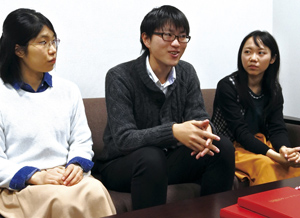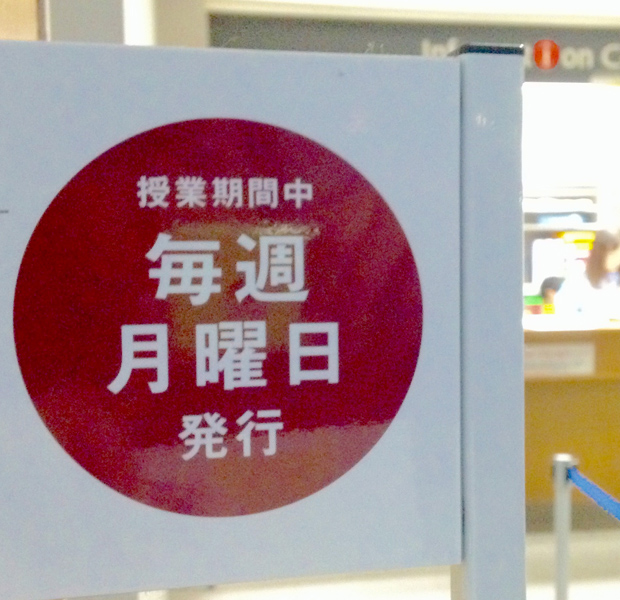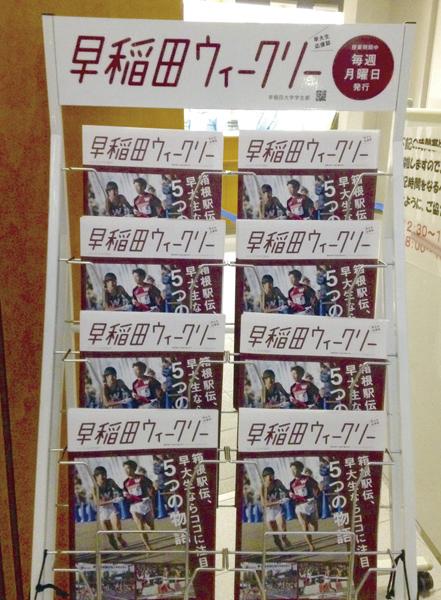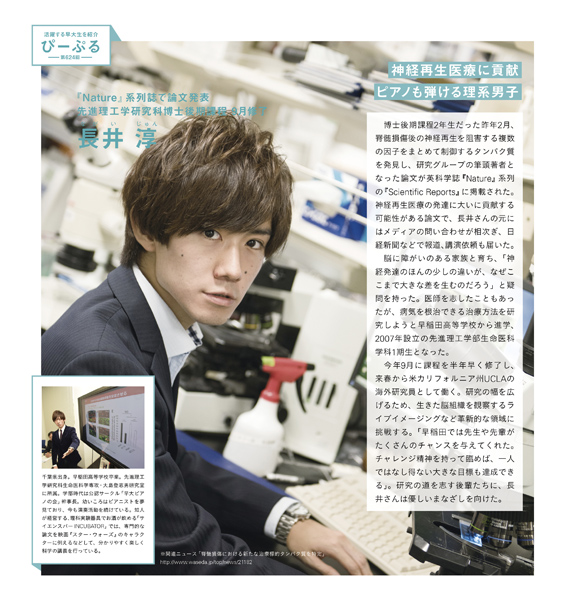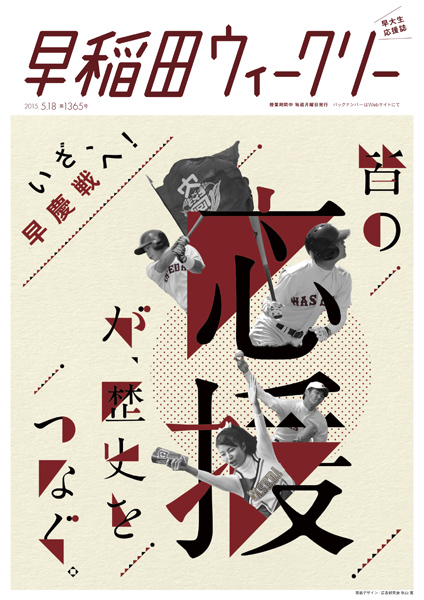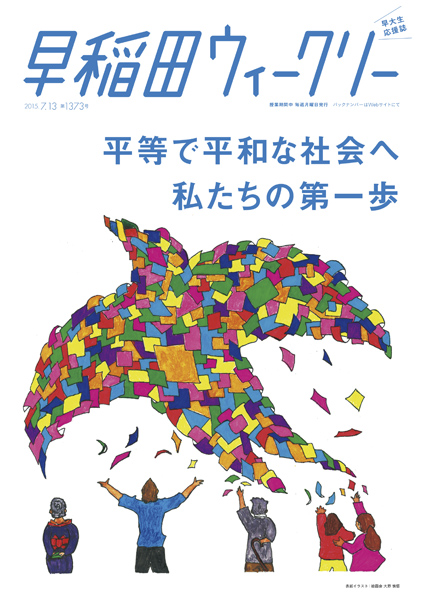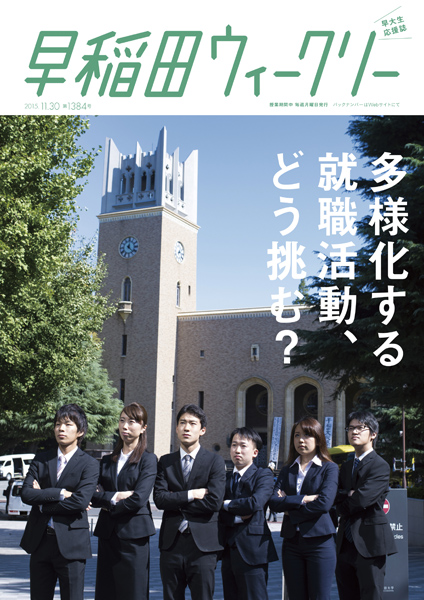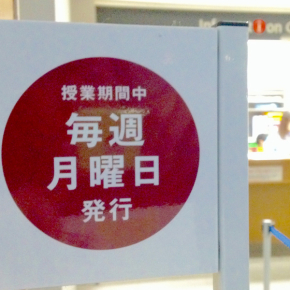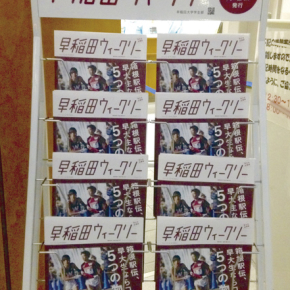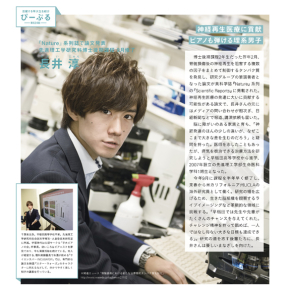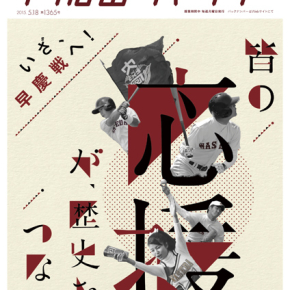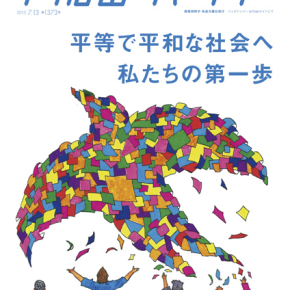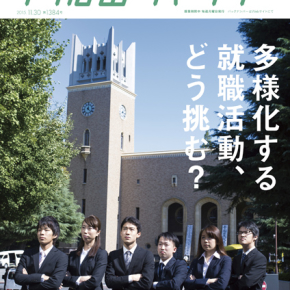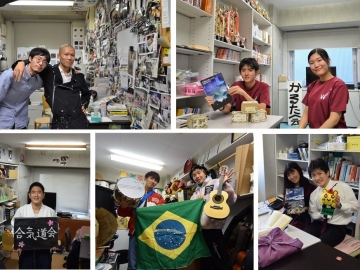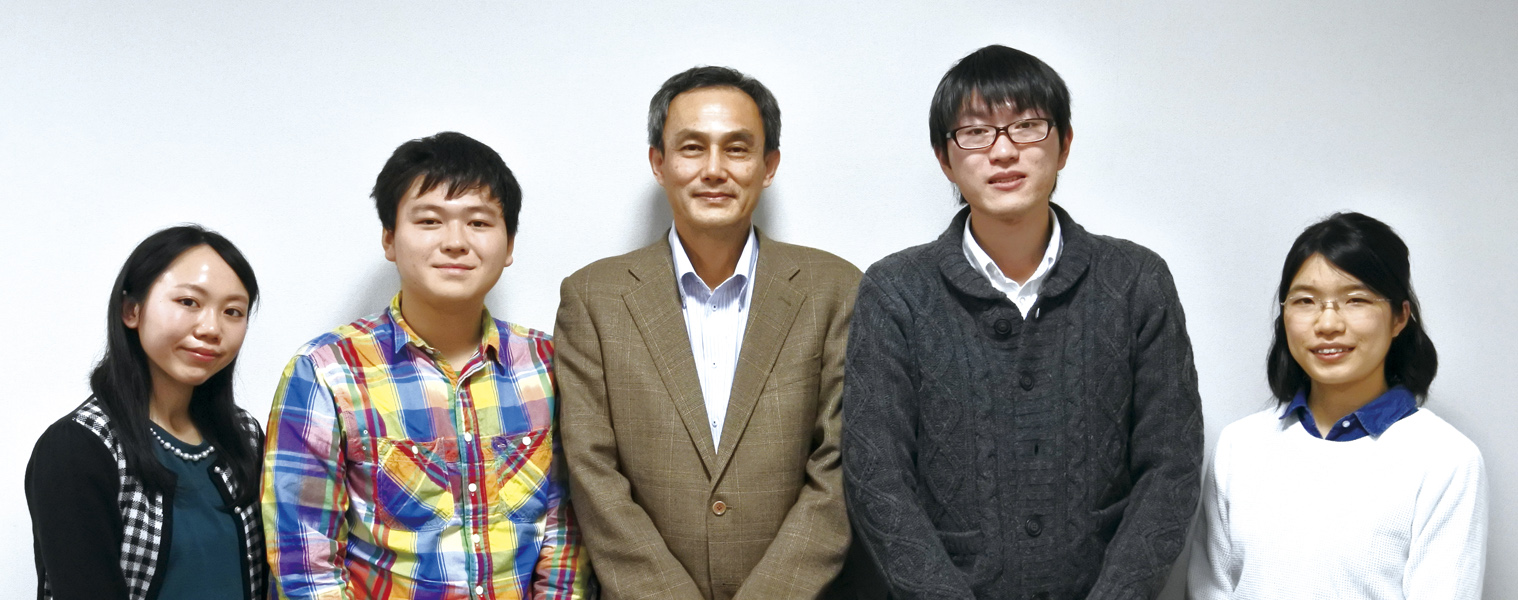
(from left)Fourth year, School of Law, Fumi Osawa, Fourth year, School of Culture, Media and Society, Junpei Oshima.Professor, Faculty of Political Science and Economics(Former Dean of Student Affairs), Kazuyuki Sasakura.Third year, School of Social Sciences, Masato Mochizuki.Fourth year, School of Humanities and Social Sciences, Moemi Sasaki
Students who have served for over two years as reader monitors*1 and Professor Kazuyuki Sasakura, a former dean of students affairs who participated in the major overhaul of the magazine in 2013 and who is still a passionate reader, gathered together to reflect on Waseda Weekly’s past and share their love for the magazine.
- Fourth year, School of Law
Fumi Osawa - Fourth year, School of Culture, Media and Society
Junpei Oshima - Professor, Faculty of Political Science and Economics(Former Dean of Student Affairs)
Kazuyuki Sasakura - Third year, School of Social Sciences
Masato Mochizuki - Fourth year, School of Humanities and Social Sciences
Moemi Sasaki
Waseda Weekly has got your back!
Sasakura—The concept behind Waseda Weekly is a magazine which supports Waseda students. Although small, this is even written on the front cover. I put those words there when I got involved in creating theWeekly as Dean of Student Affairs. The number one mission for faculty such as myself is to support students. I had a vision of believing in the abilities of our students and watching over them as if cheering them on from the sidelines of the Hakone Ekiden marathon, not telling students what to do with a condescending attitude.
Sasaki—There is a lot I can agree with in that story. I look forward to reading the “Ebicha Zone” each week, and it makes me want to work harder each time I do.
Mochizuki—I know! Lately I have been looking forward to reading “Ebicha Zone,” too. I also like “People.” I am always amazed that there are students like that here at Waseda. Learning about what other students are doing here, I feel like I’m being cheered on, too.
Osawa—Sometimes I’m surprised to see people I know appear in “People.” Even though we share classes, we haven’ had many opportunities to get into a deep conversation, and I get encouraged knowing they’re doing these amazing things.
Osawa—Now I’m embarrassed to say it, but I really like “My Waseda Cuisine…”
(Everyone laughs)
Osawa—It takes a little courage to walk into a place I don’t know. For example, Tempura Imoya, which appeared recently. For students, tempura can seem a bit high class, but thanks to “My Waseda Cuisine,” I was able to check it out. It really felt like it was supporting me.
Sasakura—Knowing that other students were working so hard can make you want to work hard as well. Information about other students can give you support—ultimately, the Weekly helps the exchange of information between students. I guess it might be that it’s not just faculty supporting students but students supporting each other.
The perks of being a reader monitor
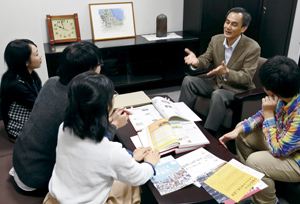 Sasakura—Well, you’ve all mentioned the names of several recurring articles in the Weekly, but what are some of your favorite columns and what are some features*2 that have really helped you?
Sasakura—Well, you’ve all mentioned the names of several recurring articles in the Weekly, but what are some of your favorite columns and what are some features*2 that have really helped you?
Oshima—You can’t leave out “My Waseda Cuisine,” but I really like “From Tables Around the World,” which talks about food culture in various countries. I heard about okkirikomi, a local dish from Gunma Prefecture, for the very first time from that column. It talks about culture even people in Japan don’t know about and unusual food culture from around the world. I find it really interesting to have the door to new cultures opened through this one column.
Osawa—I’ve found the special features on job hunting and studying abroad to be really helpful. Seeing how the overall process or schedule works and being able to look over it all on the single page of a magazine makes it really easy to grasp everything.
Mochizuki—The bulletin board feature is really convenient and gives me details on campus events that are hard to look up. Thanks to that section, I once heard about and went to see a concert being performed by a symphony on the anniversary of the university founding.
Sasaki—I’m a member of the Student Health Promotion Mutual Aid Association, and the themes and advice from specialists in the “Advice Corner” column have been really helpful. The information is really thorough when you think about events with similar themes.
Sasakura—I see! It looks like you’ve all made good use of the information that’s appeared in the Weekly. Now, have you had any good experiences not as a reader but as a student monitor?
Sasaki—I feel like since I’ve become a monitor, I’ve became able to read texts even more closely.
Osawa—By carefully reading everything, I’ve learned about things I’m not normally interested in and what topics are being talked about at the university.
Mochizuki—Being a monitor, I’ve learned about unusual events and turned that knowledge into action. And derived from that, I’ve gained much more.
Osawa—Writing my opinion as a monitor that it was difficult to tell who wrote an article, I was able to watch it be turned into something easier to understand. I really learned the importance of putting your thoughts into words.
Fifty years of history with students
Sasakura—For our little event here, I’ve had all the back numbers for the past 50 years assembled. Taking a look, you can watch how theWeekly became easier and easier to read, from black and white to two-tone to full color and pictures.
Mochizuki—Wow, the Weekly used to be published every Thursday!
Sasakura—Good eye. After thinking about how to make sure the latest edition of the Weekly got into the hands of students, it was decided to switch it to the current schedule of every Monday as it would be easier to understand that a new issue was out whenever one came back to school after the weekend. Although it does require a little pain on the part of students participating in the creation of the Weekly to make sure it’s edited and published on time, ha-ha.
Osawa—Looking at the older editions, it seems there were a lot more heavier topics like politics.
Sasakura—As indicated by the “TO ALL STUDENTS!” emblazoned on the inaugural edition, the Weekly used to have many topics that were like instructions from the university to students. Nowadays, theWeekly focuses on topics that enable students themselves to think about what they should and should not do.
Sasaki—I’m noticing that in recent editions, the illustrations and photos on the front cover sometimes include the names of various student clubs. In other words, the clubs are participating in their creation. It really shows that the Weekly has become more and more a part of students’ lives here.
Mochizuki—A club I belong to has been asked before to submit book reviews.
Sasakura—Waseda has more than 500 student-run clubs; the policy now is to encourage clubs to participate as much as possible in the portions of the magazine’s creation that they are able to. I’d like this to continue as the Weekly transitions from paper to the Web.
Towards a new Waseda Weekly which will share the charms of Waseda with the world
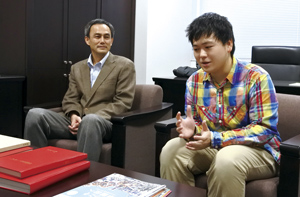 Sasakura—Lastly, let’s hear your opinions and requests for the Weekly as it transitions to a web-only format.
Sasakura—Lastly, let’s hear your opinions and requests for the Weekly as it transitions to a web-only format.
Oshima—Well, when the page title just says “Ebicha Zone Vol. XX,” you can’t tell what the topic of the column is. I think we need to design it so that it will make people want to click on the link and read the article. Also, I think it would be great if we could link “My Waseda Cuisine” with a map app to make it easier to go to the restaurant in the article.
Osawa—I feel we can add a lot more pictures.
Sasaki—I also think we could add videos and information on how a story was written or interview conducted. Also, what about increasing the number of reader surveys and adding comment boards for each article?
Mochizuki—One of the appeals of the web is how informal everything is. But I feel that the Weekly has had a different kind of “informality” than that which you find on the web. For example, the Weekly was distributed through various news racks on campus. But with the web, someone’s not going to read the Weekly unless they purposefully go to the site. I think it’s going to be pretty hard getting over that hurdle.
Osawa—I’ve heard that the Weekly has its own Twitter account*3. I think it would be a good idea to provide good information coverage through that.
Mochizuki—I don’t do Twitter, but I definitely think we should provide information to students who do. Also, websites tend to be evaluated based on their number of page views, but I’m worried about a column being canceled because it doesn’t get enough page views and the effect that will have on the Weekly as a public relations magazine for the university. That’s something that bothers me a little.
Osawa—I think we could also reorganize columns to make them better and increase the frequency with which popular columns are updated. I hope that by increasing the frequency with which the Weekly is updated, we can provide even more information.
Mochizuki—Couldn’t we also create a best of and re-post them with the transition to the web?
Sasakura—With the Weekly’s switch the web, it will be possible find out from anywhere in the world at any time what is happening at Waseda and what Waseda students are thinking. Looking at it that way, it also means that, with the Weekly being a magazine whose concept is cheering on Waseda, not only current attendees but also alumni and Waseda students all over the world will be cheering on the university. “Students supporting faculty”—I am looking forward to seeing that relationship develop and enable us to show the world the great things about Waseda.
- *1 Students registered as reader monitors, a system operated by theWaseda Weekly Editorial Office. Each week they are asked to share their opinions and impressions of the Waseda Weekly. New applicants are accepted every half-term.
- *2 In addition to the regular columns, specially planned and edited articles are created each week based on different themes. From pieces on university history to timely articles, a variety of themes are taken up throughout each year.
- *3 http://twitter.com/wasedaweekly

